

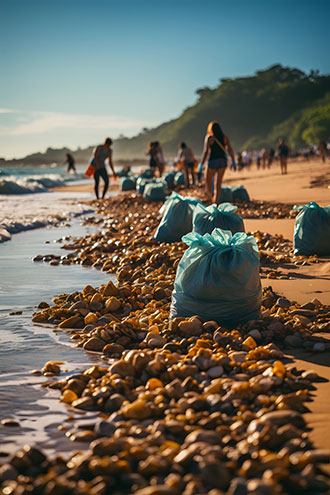
Many big companies who are co-responsible for plastic pollution are now trying to adapt to a circular economy, aimed at eliminating waste and the continual use of resources.
Looking beyond the current take-make-waste extractive industrial model, a circular economy aims to redefine growth, focusing on positive society-wide benefits.
It entails gradually decoupling economic activity from the consumption of finite resources, and designing waste out of the system.
Underpinned by a transition to renewable energy sources, the circular model builds economic, natural, and social capital.
Our mission is to activate, engage and involve people and companies worldwide, reward them with incentives to mine, clean up and recycle plastic waste out of our natural environment.
Our objective is to source, mine and clean up plastic waste out of our natural environment, turn it into a store of value (renewable materials as tradable commodities) and incentify and reward all our stakeholders for their mining and clean up activities, achievements and performance by applying new innovating and disruptive technologies.
The OP Ecosystem has been designed according the principles of a circular model and we believe by involving and incentifying people to create real impact.
The OP Ecosystem will be fully tokenized meaning that we will issue OPCOIN, the Plastic Crypto Token through a ICO (Initial Token Offering). OPCOIN tokens will be applied to reward users (people and companies who are active with cleaning up plastic waste) and as payout and payout features within the OP Marketplace.
We will also start a STO (Security Token Offering) to issue OPEQUITY as tokenized OCEANPLASTIK company shares (equity tokens) as a security. Both OPCOIN and OPEQUITY tokens will be listed on tier 1 crypto exchanges for public trading.
This tokenized approach makes it possible to give mined, collected, cleaned up, recycled and looped plastic waste a realistic value proposition and give (retail) investors the opportunitiy to invest (with a high ROI) in a clean sustainable world for future generations.
Raised funds and placed investments will be allocated to develop and operate a Tokenized Circular Ecosystem and to invest in drop off points, mining, clean up, recycling, waste-to-fuel processing and production infrastructure to process plastic waste into tradeable commodities.
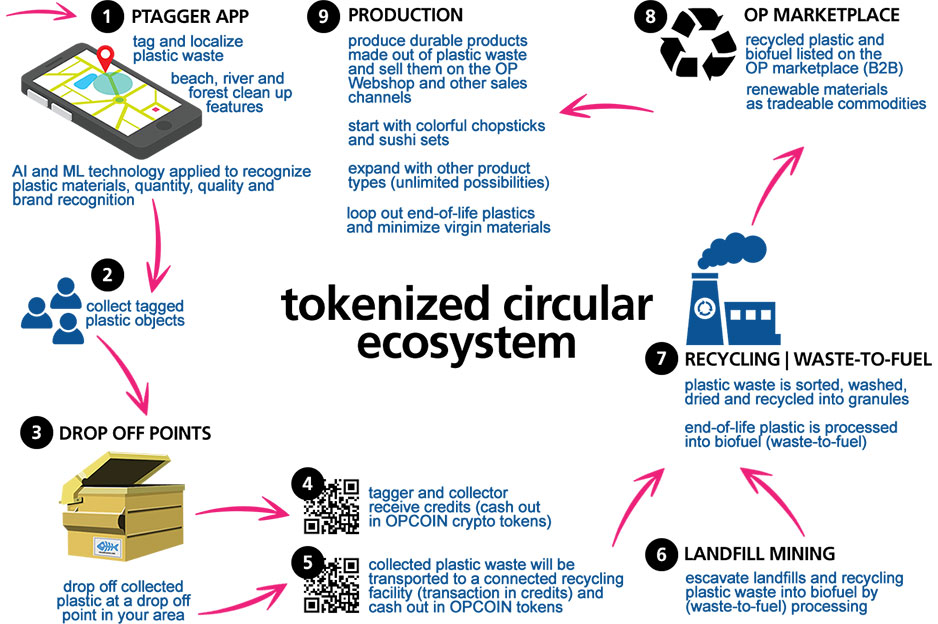
The main purpose from the OP Ecosystem is to source, clean up and recycle plastic waste out of our natural environment.
People (smartphone users) will be rewarded to tag, localize, collect and loop out plastic waste.
Recycled plastic will be processed and end-of-life plastic waste will be processed into biofuel (renewable energy) before listed on the OP Marketplace.
By applying the latest technologies we are able to give cleaned up and recycled plastic waste a realistic value proposition, create jobs, create awareness, involve local communities, provide education and connect recycling, production partners and vendors.
All stakeholders are rewarded with credits which can be exchanged into OPCOIN tokens.
From Q2/2025, everyone with a smartphone should be able to download the PTAGGER, a free mobile app (for iOS and Android) to tag, localize, collect and drop off plastic waste. Initially we will start in Bali (Indonesia) to create proof of concept and expand in other regions and countries.
The current number of smartphone users in the world today is 6.93 billion, meaning 85.74% of the world's population owns a smartphone. Each smartphone user could be a potential PTAGGER user who could contribute to tag, localize and clean up plastic waste out of our natural environment.
To be effective we would need a minimum of +500 Drop Off Points and +60 recycling partners connected onto the OP Ecosystem to localize and clean up +967,000 tons of plastic waste out of our natural environment before 2028.
This enables us to create a corporate PTAGGER version to connect companies and provide collection as a subscription based service and use generated revenues expand our mining and clean up activities.
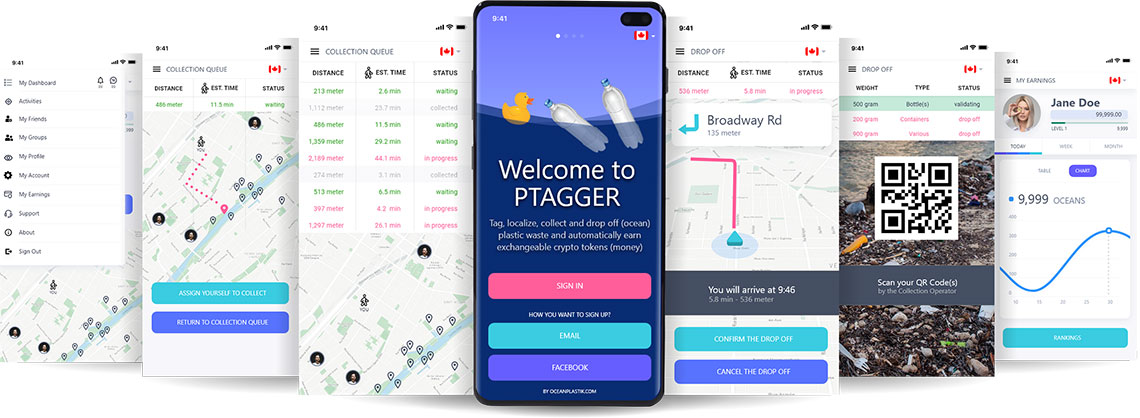
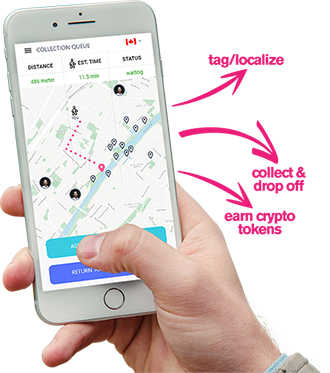 With PTAGGER we want to engage smartphone users to become real Super Heroes by tagging, collecting and dropping off plastic waste.
With PTAGGER we want to engage smartphone users to become real Super Heroes by tagging, collecting and dropping off plastic waste.
Users earn credits for all their tagging. collection and drop off activities, achievements and performance. These credits can be exchanged in OPCOIN tokens.
This approach provides a safe, secure and traceable source of income to users who live in vulnerable areas with a path out of poverty.
By applying and integrating AI and Machine Learning algorithms, our app will be able to identify plastic types, estimate quantity, quality, recognize brands and predict specific flows.
The mining, tagging, collecting and drop off activities result in a usable data metric which will be used to improve our mining and clean up activities.
Within the app we will also integrate social networking and community features for our users.
Users (taggers) can use the tag feature to localize and identify plastic waste.
This action will create a record including metadata such as a geographic position, automatic recorded photo image including a date/time stamp.
The AI algorithm will self learn, train itself and add other metadata such as plastic type(s), quality, quantity, weight estimation and brand recognition.
This app also will provide specific features to organize beach, river and forest clean up events.
Records will be added into a Collection Queue and all “collectors” in the specific area will be notified there is plastic waste to be collected.
Collectors are required to assign themself to collect tagged plastic waste.
After an user assigned him/herself for collection, the user will get in-app navigational instructions to collect the tagged plastic waste.
The user can now select to continue to collect or drop off the his/her collections at the nearest Drop Off Point.
Drop Off Points are physical locations where collectors can drop off collected plastic waste.
Initially we will create and operate our own Drop Off Points to create proof of concept and use that experience to expand and connect with drop off points managed by partners.
At the Drop Off Point all collections will be scanned (User's QR codes), weighted on a digital scale and confirmed by the Drop Off Point operator.
Once processed both the Tagger and Collector are automatically rewarded with credits.
Drop Off Points will disitribute available batches of collected plastic waste and notify nearby recycling partners.
Once a recycling partner accepts the purchasing order, the purchased batches will be prepared for distribution and delivery.
The recycling partners will process the plastic waste and can list the renewable plastic materials and end-of-life plastic on the OP Marketplace (B2B) as tradeable commodities.
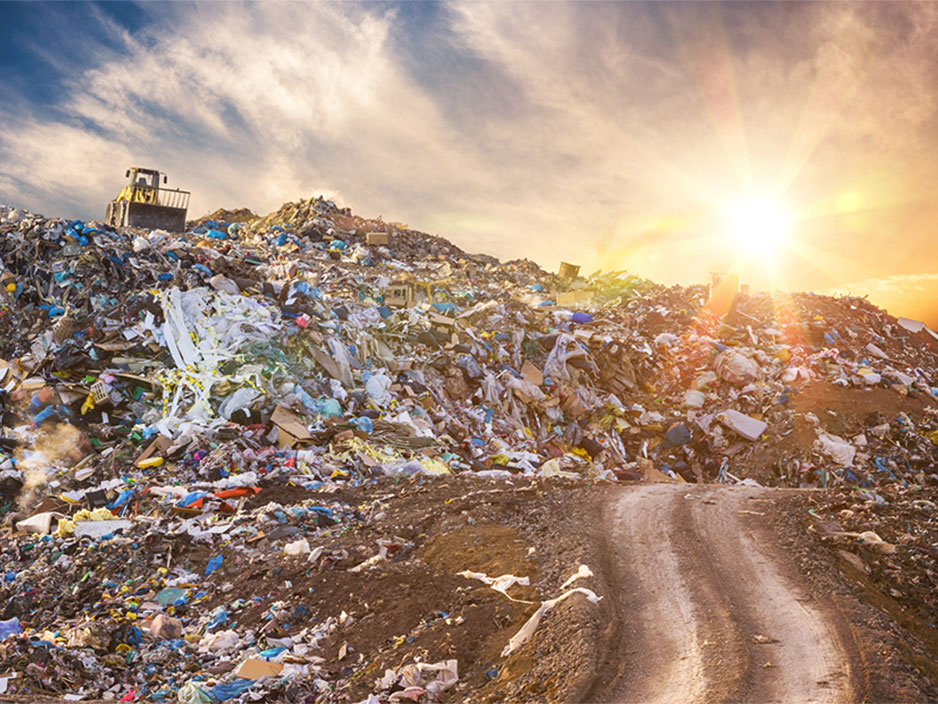
Half of the world's plastic waste goes straight to landfills where it takes around 300 years to photodegrade and eventually breaks down into tiny toxic particles that contaminate the soil and waterways entering the food chain when animals accidentally ingest them.
Half of the world's plastic still goes straight to landfill. 9% is recycled and another fifth is mismanaged, meaning it is not recycled, incinerated, or kept in sealed landfills putting it at risk of being leaked into rivers, lakes and the ocean.
One of our points of interest in our strategy is landfill mining which includes the excavation, processing and/or recycling from deposited plastic waste.
End-of-life plastic waste will be processed for waste-to-fuel processing. Recyclable plastic materials will be processed and biofuel will be listed on the OP Marketplace.
By 2028, we intend to have +50 landfill mining facilities operational to loop out plastic waste out of our natural environment.
 End-of-life plastic waste will be processed into biofuel through WASTX Plastic machinery from our strategic infrastructure partner BIOFABRIK (expert in sustainable plastic-to-fuel recycling).
End-of-life plastic waste will be processed into biofuel through WASTX Plastic machinery from our strategic infrastructure partner BIOFABRIK (expert in sustainable plastic-to-fuel recycling).
BIOFABRIK WASTX technology is to process plastic waste and recycle it into pyrolysis oil as a sustainable replacement for fossil fuel.
One BIOFABRIK WASTX unit can process up to 5,000 kilograms of recycled plastic waste per day into 4,250 liter biofuel. With a price tag of € 0.70 per liter, one BIOFABRIK WASTX unit can generate a daily revenue performance output of € 2,975.
To put things in perspective, +/- 4.8 billion metric tons of plastic waste is stored in landfills (worldwide) that is ready and needs to be excavated, recycled, processed and turn into value.
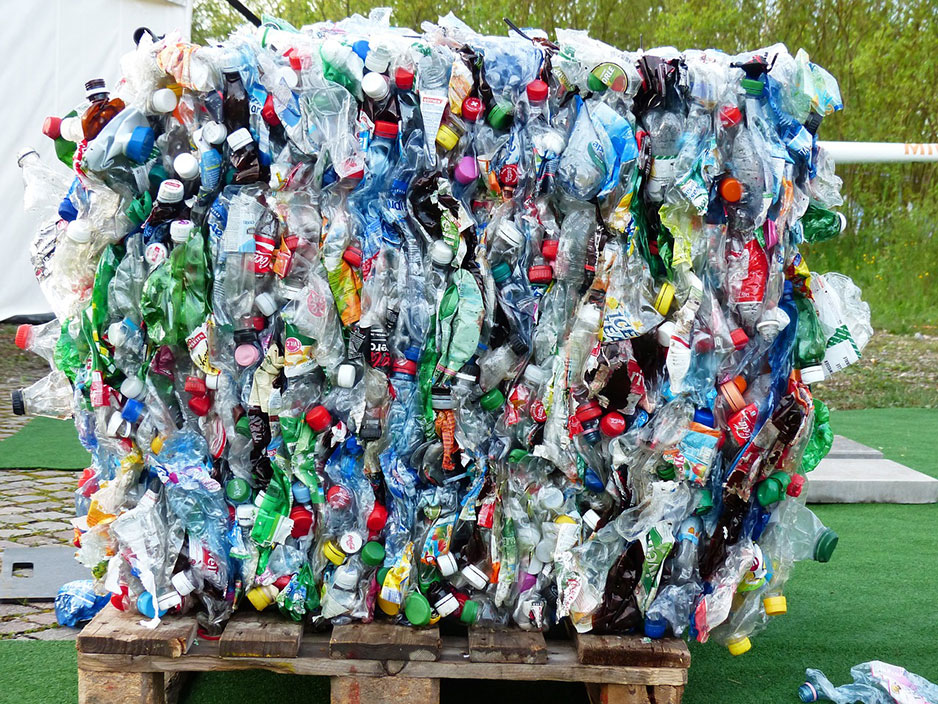
Recycling plastic materials is an essential acivitity within the OP Ecosystem.
Mined plastic waste needs to be sorted, washed, dried and processed into granules or flakes.
The sorting process is important to make sure that plastic materials are not mixed to keep the best quality. During our sorting, we only focus on the following plastic types for recycling:
All other plastic types will be shredded and packaged for pyrolysis recycling (waste-to-fuel) purposes.
Recycling companies will have access to features to specify, price tag, categorize and publish recycled plastic materials and biofuel on the OP Marketplace.
The OP Marketplace is a B2B community platform for companies who are active with plastic recycling, plastic production or provide recycling or production machinery, products and/or services.
All companies (marketplace partners) are required to sign up and to pay an annual subscription (Standard or Premium) fee to use all the marketplace features. Companies are able to buy or sell their recycled plastic materials, biofuel, machinery, products and/or services on the OP Marketplace.
Each company can create their own profile, dashboard, activity feed and will have access to social networking and community features. Companies can also list job vacancies.
Each company will get an on-site ewallet (credits) and is required to purchase or pay with credits. Credit packages can be bought with fiat or cryptocurrencies.
Over each buy | sell transactions we will charge a 7.50% commission fee (3.25% for both the selling and buying party). All payout requests (on-site credits) are paid and distributed in OPCOIN tokens.
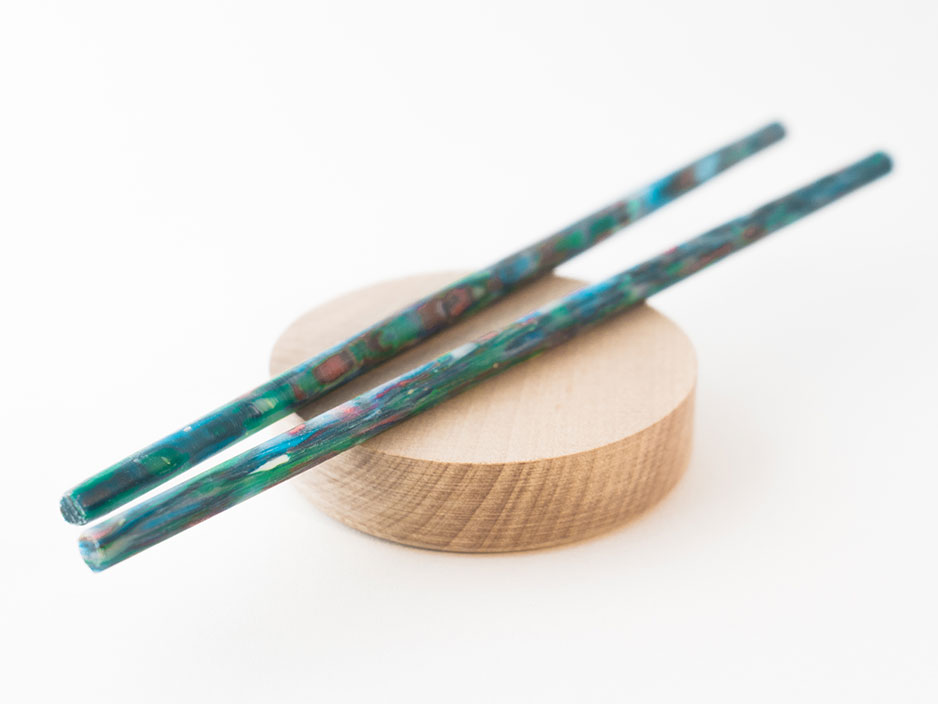
OP’s objective is to develop and produce unique durable products made out of recycled plastic waste, collaborating with others (sustainable brands) and additionally accepting third party production orders.
With the development and production activities, we can brand OP and use the sales profits to invest in mining, clean up, recycling, waste-to-fuel processing and production activities and reward our token holders (investors).
The first products made out of recycled plastic waste are unique colorful chopsticks, sushi sets, trays and bowls.
Later we intend to expand with producing products such as pots, vases, photo frames, smartphone cases, panels, furniture and building brick containers (possible in collaboration with sustainable brands).
All our products will be available on the OP webshop, partner’s webshops and/or other sales channels.
The OP webshop will get an affiliate program (revenue share only) to provide affiliates effective tools to promote our products.
The OP Ecosystem makes it possible to give mined, cleaned up and recycled plastic waste a realistic value proposition and to loop out end-of-life plastic waste. Users who tag, localize, collect, drop off plastic waste and partners who recycle plastic waste or who are active with waste-to-fuel processing are all rewarded with OPCOIN tokens.
In the wild west gold rush times people where hyper active to excavate gold. In today's time we want to engage people to source, mine and excavate plastic waste as the new digital gold!
The reality is that processed plastic waste (as renewable plastic materials or as biofuel) definitely has a value as tradeable commodities.
€
per kilo
€
per kilo
€
per kilo
€
per liter
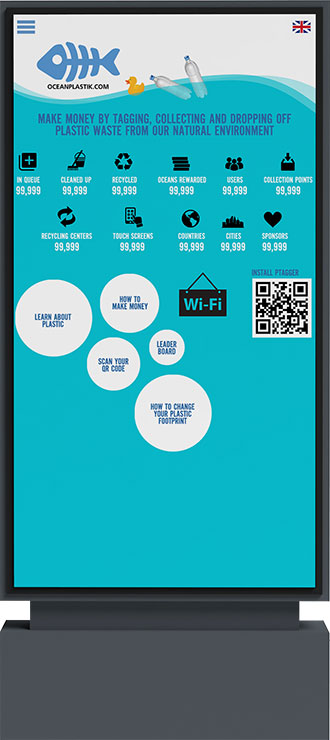 Unfortunately not everyone is aware about the impact and effects the global plastic pollution problem has on human civilization.
Unfortunately not everyone is aware about the impact and effects the global plastic pollution problem has on human civilization.
By developing educational programs and mobile games we want to provide free education about plastic to schools, children and local communities. Educational interactive programs are very important as this is a method to educate PTAGGER AI algorithms.
With mobile games we can educate children (within the age 5 till 12 years) in a playful way what plastic pollution does to our natural environment.
With interactive multiplay strategy games (based on the principles of PTAGGER) players can build facilities (recycling and production), expand with machinery, taggers, collectors, drop off points to mine and process collected plastic waste to earn credits.
The main purposes of this mobile game is entertainment and education but this will also serve as a bridge to promote PTAGGER and engage users to start to tag, localize and drop off plastic waste to earn money.
OCEANPLASTIK SRO
Namesti Svobody 18
60200 Brno, Czech Republic
phone: +420 7766 40481